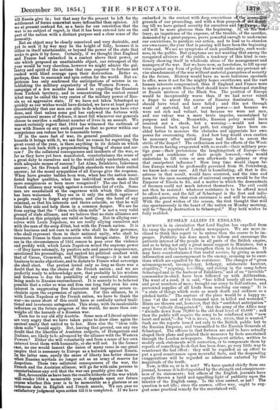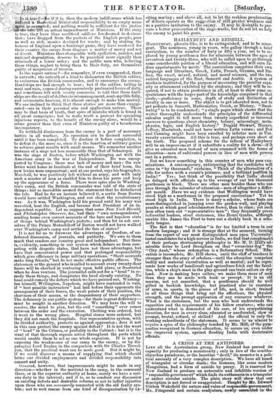o
- Is it true ..e.e- r if it is, then the modem indifference whioh has cod a thJ reties.' Minieterfal responsibility to an empty. neme 14 ele..ceerected; and nothing would be sufficient for the justice 'heee'M an actual impeachment of Ministers. If the story is true, they have thus sacrificed soldiers foredoomed to destruc- tion; have dragged from the pockets of the English people,, poor as well as rich, monies destined for waste; and by staking the honour of England upon a bankrupt game, they have rendered for their country the escape from disgrace a matter of mercy and not of desert. Ministers thus chargeable with spoliation, murder, and national degradation, deserve to be punished more signally than criminals of a lower order ;• and the public men who, believing these things, neglect to bring them to their duty, are themselves guilty of misprision of treason. ,
Is the report untrue ?—fer remember, if even exaggerated, there is untruth; the untruth of a kind to dishearten the British soldier, to embarrass the British 'commander, and to encourage the enemy. Hardships are bad enough to bear ; but if the solaier, toiling in mud and rain, exposed during excessively protracted hours of duty, and sometimes left with scanty commons, is told that those hard- ships are the result of deliberate mismanagement, contemptible folly, and aristocratic hauteur, it is almost enough to make him mutiny. We are inclined to think that these stories are more than exaggee rated—are in their personal aim and application untrue. There may be that basis of truth, that spice of mistake which is found in all great campaigns; but to make truth a pretext for spreading injurious reports, to the benefit of the enemy alone, would be a crime greater than that even of Ministers guilty of a treacherous incompetency. To withhold disclosures from the enemy is a part of necessary tactics in all warfare. No operation can be deemed successful until it has been completed. To disclose it before completion, is to defeat it; the more so, since it is the function of military genius to achieve great results with small means. We remember another instance of a siege not less memorable than that of Sebastopol. It was the siege of Boston, before which Washington sat with the American army in the war of Independence. He was unsup- ported by Congress; there was lack of money and men; the raw levies went home in lassitude at the end of their brief term, the new levies were unpunctual ; and at one period, says his biographer, Marshall, he was positively left without an army, and with only such a muster of men as enabled him to dress his posts and keep up the appearance of a force. There were spies also in Washing- ton's camp, and the British commander was told of the state of things; but so incredible seemed the statement that he disbelieved the tale. Had he for an instant believed it, a sortie from Boston would have settled Washington, and cut short the revolationark war. As it was, Washington held his ground until his army was recruited, beat the English, and became first President of an in- dependent republic. Let us suppose that some New York Herald, and PhiladeWzia Observer, 8ce., had their "own correspondents,' sending home even correct accounts of the bare and hopeless state of things behind Washington's pickets ; and then let us ask our- selves if the Prince Menschikoff of Boston would not have walked over Washington's camp and settled the fate of states?
. It is not for us to forswear the advantages of freedom, of un- fettered discussion, of journals, and publicity. We owe to them Much that renders our country great and independent. But there is, evidently, something in our system which debars us from com- peting with despotic .states, that have not those advantages, but have that concentrated power and that prolonged responsibility which give efficiency in large military operations. "Short accounts make long friends," but do not make effective public Officers. The statesman or the general who is called to account every twenty-four hours will be checked in venturing upon bold plans, or frustrated when he does venture. The journalist calls out for a "head" to re- medy these things and decapitates the head already existing. No head could remedy the defects which we have pointed. out. Washing- ton himself, Wellington, Napoleon, might have contended in vain, if " best possible instrnoters" had laid before their opponents the arrangement of their forces, the weak points of their position the shortness of their means, or the despondency of their supporters. The deficiency in our public system—for there is great deficiency— must be sought in another direction. We may have the will to resolve, the mind to plan, but the evil "something" ever comes between the order and the execution. Clothing was ordered, but it went to the wrong place. Hospital stores were ordered; but they did not reach the hospitals. Our representative system, with its divided authority, protects us against oppression ; does it not in this case protect the enemy against defeat? It is not the want of "head" in the Crimea, or probably in the Cabinet ; but it is the want of that thorough organic action throughout the parts which would enable them to act as one whole organism. It is not by exposing the weaknesses of our camp to the enemy, or by dis- paraging Lord Raglan in the comparison with Sir Charles Trevel- yan, that the practical want can be made good. But it might be, if we could discover a means of supplying that which should bring our divided employments and divided responsibility into
concert and unity.
Granted, however, that improvements might be made in any direction—whether in the materiel in the camp, in the coulmand there, or in the superior authority at home, surely we have a seri- ous duty in the interval ; and it is, so to conduct our discussion on existing defects and desirable reforms as not to inflict injustice upon those who are necessarily connected with the old faulty sys- tem; not to seek rescue from one kind of disorganization by ex- citing mutiny ; and-above all, not to let the reckless proclamation of defects Opetate as the suggestion of still greater weakness aid as a pesitive inyitatien to the enemy. It may be desirable to pro- cure a' better prosecution of the siege-works, but do not let us help the enemy to point his guns.



























 Previous page
Previous page